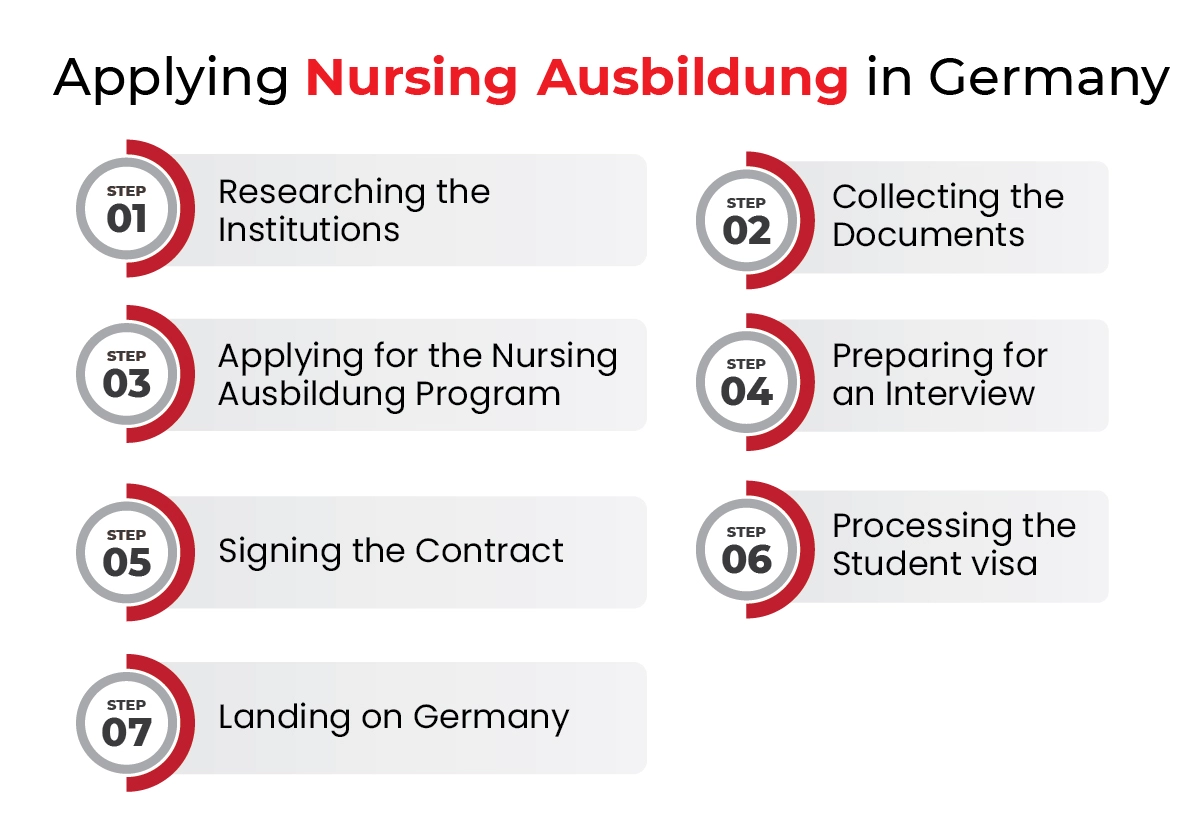Are you a nursing aspirant? Have you completed your 12th grade? Germany offers a lot of advantages if you are choosing to study Nursing in Germany after 12th. The healthcare system is well-established and students benefit a lot from the curriculum and clinical training opportunities. We will be discussing more in the following paragraphs.
Let’s dive into the blog and learn all about the different types of courses that are available, the nursing schools, the requirements you must meet, the fees, how to apply, and the jobs and salaries for nursing professionals in Germany.
Table of Content
1Study Nursing in Germany for International Students2Nursing Courses in Germany3Nursing Schools in Germany4Requirements to Study Nursing in Germany for International Students5Nursing in Germany after 12th Fees6How to Apply for Nursing in Germany after 12th7Nursing Jobs in Germany for Foreigners8Salary of Nurses in Germany Per Month9Conclusion10Frequently Asked Questions
Study Nursing in Germany for International Students
If you are considering studying nursing in Germany after your schooling, here’s a list of reasons on why you should.
- Offers you extensive nursing training in patient care and advanced nursing practices with practical training.
- You do not have to pay the tuition fees for Nursing programs at the public universities in Germany.
- You get a monthly stipend.
- You can do part-time work up to 140 full days or 280 half days in a year.
- Due to an ageing population, there is a constant demand for healthcare professionals, especially for nurses in Germany.
- With many abundant job opportunities in the country, students can even apply for jobs after completing their studies by getting a post-study work permit.
- If you are confused about whether to pursue a diploma or bachelor’s course in Germany, there’s actually no difference between them.
Nursing Courses in Germany
In Germany, there are several types of nursing courses:
Bachelor’s Degree in Nursing
BSc Nursing in Germany typically takes 3 to 4 years.
Provides a solid foundation in medical knowledge, patient care, and nursing ethics. Students undergo clinical training in various healthcare settings, ensuring they gain hands-on experience in patient care.
Master’s in Nursing
MSc Nursing in Germany is a post-bachelor’s program for advanced roles in management, specialization or research which typically lasts 2 years.
Focuses on enhancing clinical knowledge, strategic management skills, and evidence-based practice in the healthcare field.
Nursing Ausbildung
A vocational program called the Ausbildung program where the course duration is 3 years. Students gain practical experience while attending classes at vocational schools and are trained in various aspects of nursing, including patient care, medical procedures, and healthcare ethics, all while working directly in hospitals or nursing homes.
Graduates in Ausbildung are qualified to work as fully certified nurses.
Specialized Nursing Program
These programs are typically pursued after completing a general nursing qualification. There are specialized training courses such as paediatrics, geriatrics, or intensive care. These programs ensure nurses are highly skilled and ready for specialised roles in various healthcare settings.
Nursing Schools in Germany
Some of the best schools to study nursing in Germany after 12th are:

1. Hochschule für Gesundheit (University of Health Sciences), Bochum
A prestigious institution offering a variety of programs with an emphasis on clinical practice, research skills and leadership roles in healthcare.
| Type of University |
|
| Location |
|
| Popular Courses |
|
2. Heidelberg University
One of the oldest and leading universities in Germany, offers specialized nursing programs with a focus on evidence-based practice, research, and advanced clinical skills.
| Type of University |
|
| Location |
|
| Popular Courses |
|
3. University of Freiburg
This university offers innovative nursing programs that focus on the intersection of practical basic nursing skills and scientific development, preparing students for modern healthcare challenges.
| Type of University |
|
| Location |
|
| Popular Courses |
|
4. Hof University of Applied Sciences
Known for its Nursing program, this university combines a modern and comprehensive approach to patient care, ensuring students can build their professional, methodological and personal development.
| Type of University |
|
| Location |
|
| Popular Courses |
|
5. The Charité – Universitätsmedizin Berlin
Being Europe’s largest university hospital is affiliated with Humboldt University and the Free University of Berlin, offering nursing education with strong practical components, focusing on community health, chronic disease management, and advanced clinical practice.
| Type of University |
|
| Location |
|
| Popular Courses |
|
Requirements to Study Nursing in Germany for International Students
Eligibility Criteria
Before we move on to the eligibility criteria:
Indian students with 12 years of education should be aware that they are generally not directly eligible for a bachelor’s degree university admission, as 12th-grade schooling does not meet the German standard of 13 years.
To bridge this gap, Germany offers a Foundation Year (Studienkolleg), which helps international students to meet the educational requirements for university admission. Upon successful completion of this Foundation Year Program, students can then apply for university programs after passing the Feststellungsprüfung assessment test.
Now, if you are applying for an Ausbildung program, you don’t need to complete a Studienkolleg.
Requirements you need to meet to study nursing in Germany after 12th are:
- Academic Certification
For bachelor’s: 12th Grade Certification and Studienkolleg(Foundation Year Program)
For master’s: Bachelor’s Degree or equivalent qualification. - German Language Proficiency
Depending on the federal state, a B1 or B2 German Language Proficiency is required. - Age
Below 30 years of age. - Health and Medical Fitness
Show good health and fitness since nursing involves hands-on patient care. - Visa requirements
If you are from a non-European country, you will require a student visa to study in Germany.
Documents Required
- Academic Certifications
- Valid Passport
- Proof of English Language Proficiency
- Police Clearance Certificate
- Statement of Purpose(SOP)
- Letters of Recommendation(LOR)
- Proof of Finance
- Health Insurance
- Cover Letter
- Other Documents (if applicable)
Nursing in Germany after 12th Fees
Although tuition is free in Germany, you have to cover your living and other miscellaneous expenses such as application fees, insurance, accommodation, and transportation. There are even many Germany scholarship available provided you meet the requirements.
In public universities:
| Degree | Academics | Living and Accommodation |
|---|---|---|
| Bachelor’s | No tuition fees | Accommodation, daily expenses, transportation, and other expenses can cost approximately a total of €800 to €1,000 per month. |
| Master’s | No tuition fees |
In private universities:
| Degree | Academics | Living and Accommodation |
|---|---|---|
| Bachelor’s | €5,000 to €18,000 | Accommodation, daily expenses, and transportation can cost approximately a total of €800 to €1,000 per month. |
| Master’s | €10,000 to €22,000 |
How to Apply for Nursing in Germany after 12th
Here’s a step-by-step process on how to apply to study nursing in Germany after 12th:
Step 1: Research your Preferred Program
Research the nursing programs that match your interests and qualifications. Most universities offer nursing programs through vocational training institutes or university hospitals.
Step 2: Check for Requirements
Check for the requirements and deadlines for the nursing program of the chosen specific university or vocational school.
Step 3: Gather all the Required Documents
Gather all the required documents and prepare your application.
Step 4: Apply through the University Website
You can then apply either online through the university’s official website or use a portal like Uni-Assist.
Step 5: Apply for Student Visa
After you have been accepted into a program, apply for a Germany student visa after you have completed all the requirements, and upon receiving the visa, you can start planning your accommodation and travel.
If you are confused about how, when, and where to apply to study nursing in Germany after 12th, contact CanApprove today for a smooth and hassle-free application process.
Nursing Jobs in Germany for Foreigners
Did you know, according to make-it-in-germany, 1.8 million people are employed in Germany in the nursing sector in jobs subject to compulsory social insurance and 16% of them are foreign nationals? After you have completed your nursing studies, Germany offers you an 18-month post-graduation work permit so that you can search for job opportunities in your specific field. You can work in hospitals, and nursing homes, provide nursing care for private individuals, palliative care, and medical rehabilitation. If you can find a job within the allotted time you can potentially stay in Germany to work as a nurse. You just have to make sure that you meet the requirements.
Here’s a list of potential jobs in Germany:
- Registered Nurse
- Pediatric Nurse
- Geriatric Nurse
- Clinical Nurse Specialist
- Nurse Educator
- Nurse Manager
- Emergency Room Nurse
- ICU Nurse
- Homecare Nurse
- Palliative Nurse
Salary of Nurses in Germany Per Month
If you decide to study Nursing in Germany after 12th, here’s the salary for Nurses after you have completed your studies.
According to experience in Germany per month:
| Experience | Salary Range per Month |
|---|---|
| Entry-level Nurses | Around €2,000 to €3,000 |
| Mid-level Nurses | Between €3,000 to €3,500 |
| Experienced Nurses | Upwards of €4,000 per month, depending on years of experience and location. |
According to potential jobs in Germany per month are:
| S.No | Potential Jobs | Average Salary (EUR/month) |
|---|---|---|
| 1 | Registered Nurse | €3,141 |
| 2 | Pediatric Nurse | €3,980 |
| 3 | Nurse Educator | €2,880 |
| 4 | Caregiver | €2,200 |
| 5 | Learning Disability Nurse | €2,970 |
| 6 | Mental Health Nurse | €2,770 |
| 7 | Midwife | €3,300 |
| 8 | Trainee Nurse | €2,600 |
Do bear in mind that this is an average salary for a month, this can vary entirely with experience and the location.
Conclusion
With a range of nursing programs and specializations, you can easily find courses that align with your interests and career goals. The combination of affordable tuition fees, practical training, and excellent job opportunities makes Germany an attractive destination for aspiring nurses.
Moreover, with numerous job opportunities and competitive salaries, nursing in Germany not only provides a rewarding academic experience but also opens doors to a fulfilling career in healthcare. CanApprove is one of the best Germany education consultants, and you can trust CanApprove to make your Germany Abroad education a reality! Why wait, contact us today!



